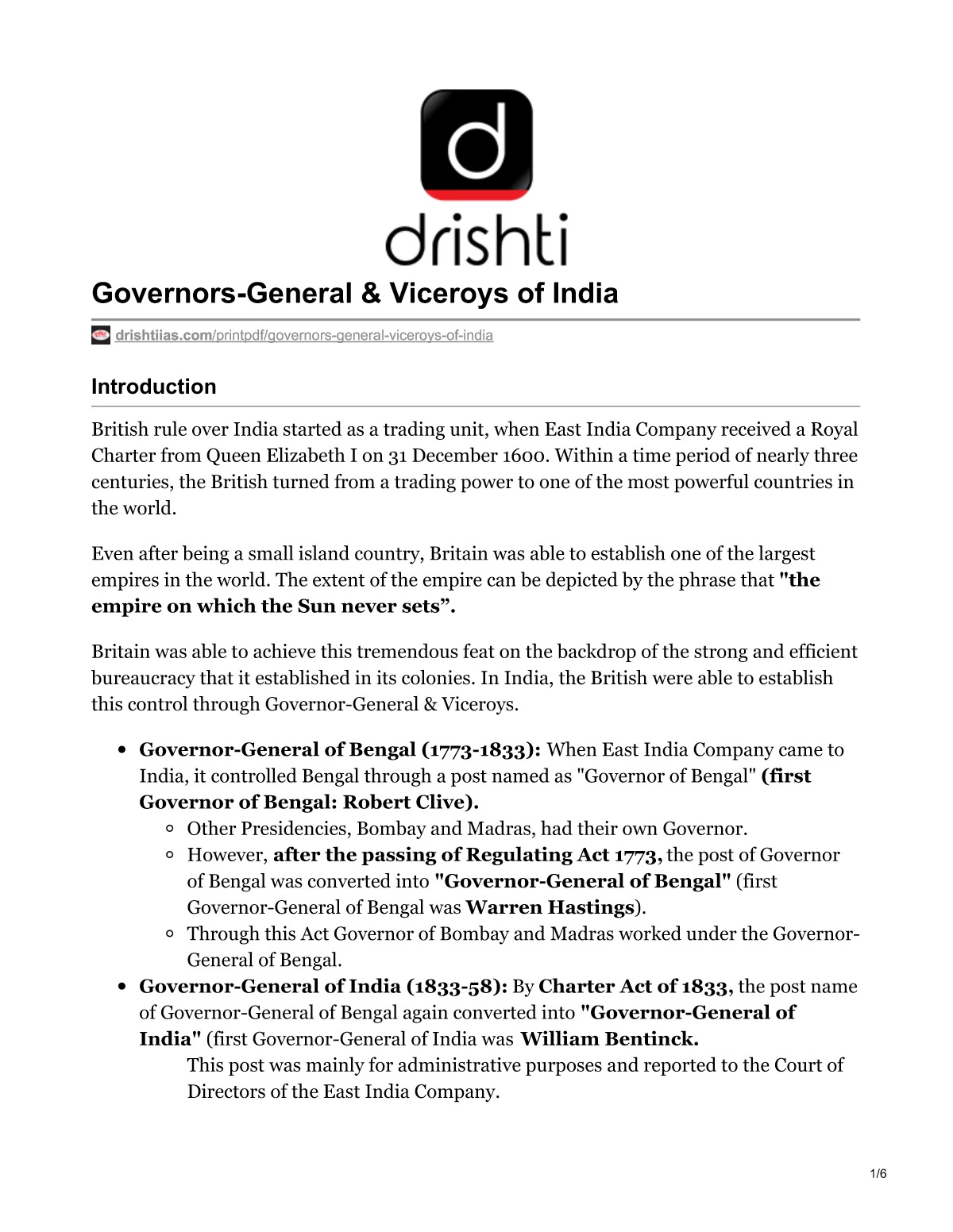Preview PDFIndian Governor General List
India did have a Governor-General during the period of British rule. The Governor-General of India was the representative of the British monarch and held significant executive and legislative powers. This role underwent various changes over time, and by the time of India gaining independence in 1947, the last British-appointed Governor-General, Lord Louis Mountbatten, continued briefly as the first Governor-General of independent India before the country became a republic in 1950.
Governors-General of India List
| Year | Governors-General of India | Major Reforms |
|---|
| 1772-1785 | Warren Hastings | First Governor-General of Bengal- End to the dual system of administration
- Regulating Act of 1773
- Supreme Court at Calcutta
- Asiatic Society of Bengal
- First Anglo-Maratha War and Treaty of Salbai
- First English translation of Bhagavad Gita
- Pitt’s India Act-1784
|
| 1786-1793 | Lord Cornwallis | - Establishment of Appellate courts and lower grade courts
- Establishment of Sanskrit college
- Third Anglo-Mysore War and Treaty of Seringapatam
- Introduction of Permanent Settlement and civil services
|
| 1793-1798 | Sir John Shore | - Charter act of 1793
- Policy of Non-intervention
- Battle of Kharda
|
| 1798-1805 | Lord Wellesley | - Introduction of Subsidiary Alliance System
- Fourth Anglo- Mysore war and the Treaty of Bassein
- Second Anglo – Maratha war
- Establishment of Madras presidency
- Establishing Fort William College at Calcutta
|
| 1805-1807 | Sir George Barlow | - The Acting Governor-General of India until the arrival of Lord Minto,
- Diminished the area of British territory because of his passion for economy and retrenchment,
- The Mutiny of Vellore took place in 1806
|
| 1807-1813 | Lord Minto I | - Concluded the treaty of Amritsar with Maharaja Ranjit Singh in 1809,
- Introduced the Charter Act of 1813
|
| 1813-1823 | Lord Hastings | - The policy of Non-intervention came to an end
- third Anglo-Maratha war
- Abolition of Peshwaship
- Establishment of the Ryotwari System in Madras (By Thomas Munroe) and Bombay
- Mahalwari system in north-western Provinces and Bombay
|
| 1823-1828 | Lord Amherst | - The annexation of Assam leading to the first Burmese war of 1824,
- The mutiny of Barrackpore in 1824
|
| 1828-1835 | Lord William Bentinck | - First Governor-General of India (Charter Act of 1833 made Governor-General of Bengal as Governor-General of India.)
- Abolition of Sati
- Suppression of Thugee, infanticide and child sacrifices.
- English Education Act of 1835
- Medical College and Hospital, Kolkata
|
| 1835-1836 | Lord Charles Metcalfe | - ‘Liberator of the Indian press
- detached all restraints on an open press
|
| 1836-1842 | Lord Auckland | - Dedicated himself to the improvement of native schools and the expansion of the commercial industry of India
- The first Anglo-Afghan war
|
| 1842-1844 | Lord Ellenborough | Sindh was annexed |
| 1844-1848 | Lord Hardinge I | First Anglo Sikh War (1845-46) |
| Lord Dalhousie (Governors-General of India) | - Introduced ‘Doctrine of Lapse‘
- Doctrine of Good
- Charles Wood Dispatch
- Post Office Act, 1854
- 1st Railway line connecting Bombay and Thane
- Established engineering college in Roorkee
- Second Anglo-Sikh War
- First telegraph line
- Establishment of the Public Works Department
- Abolition of titles and pensions.
- Started Competitive examination for Indian Civil Services
- Widow Remarriage Act
|
| 1856-1857 | Lord Canning | - Three universities at Calcutta, Madras and Bombay in 1857 were established
- Revolt of 1857 took place
Note – Post-1857 Revolt, Governor-General of India was made Viceroy of British India and Canning became the first Viceroy of India/British India. |
Download Indian Governor General List PDF
Free Download 